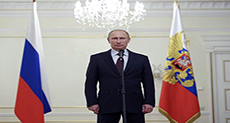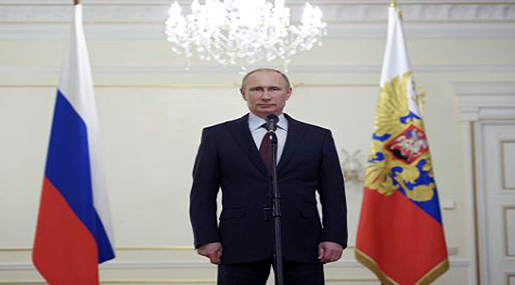
The Caesar’s Timing: Baghdad Room, The Battlefield and Intelligence work

Ibrahim Al-Amin
The head is Iranian and the members Russians and Syrians, as well as Iraqis from the army and the popular mobilization forces.

The pace of the cooperation between Iran, Russia, Iraq and Syria is accelerating, expanding far beyond intelligence. The structural organization has become clear, and as for the tasks that the coordination center may be entrusted with began with the intelligence dossier, with information indicating that it will grow in complexity and importance over time to include other aspects of the fight with "ISIL", including offensives.
Over the past few days, talk has surfaced about what has been called the "The Centre for Information Coordination", the formation of which was announced in Baghdad, and [comprised] of Iran, Iraq, Syria and Russia. This was the first sign of the build-up of the Russian military presence in Syria in support of President Bashar al-Assad, within the framework of what has become known as the "4 + 1" coalition. [The coalition] includes the four states in addition to Hizbullah. Its work is not limited to the Syrian arena, but includes Iraq as well. Or rather, it includes every area where terrorist groups are expanding, the first and foremost of which is "ISIL".
When the establishment of the center was announced, several sides, including the Iraqi Prime Minister, were keen on limiting its work to intelligence. Namely, collecting information on terrorist groups and their organizational structure, hierarchies, numbers and weaponry, geographical presence, the methods of their logistical supply, the sources of this supply, and any such data which helps to develop plans, determine the mechanisms, methods, and type of weapons that should be used to target them. However, it seems that the story is much more complicated than what has been announced.
Sources from Baghdad indicate that this room will, among other tasks, "provide direct combat assistance during operations and confrontations", in the sense that its role is beyond "providing daily intelligence reports". Even further, the sources point out the nature of this room, and the nature of its setup, is such that caution is being taken to keep it free from any US infiltration - whether directly or through an intermediary - as the emerging military alliance is keen to use all possible means to eliminate "ISIL" and pursue terrorists in Iraq and Syria. [The alliance] is striving to prevent the United States from gaining access to the alliance's operations rooms, because of the lack of trust [they have in the US], and secondly, by virtue of the evidence that is growing day by day of Washington's involvement in the creation of these groups, its support for them, and its use of them for its own ends.
Work on the formation of this room has just begun, with the arrival of six experts from Russia to Baghdad, with the same number from Iran, to be followed by six Syrian counterparts, to Baghdad. The meetings [in the Iraqi capital] are taking place in full swing with the aim of completing the final details in the quickest possible time.
Until now, most points related to this move have been agreed upon, at the forefront of which is that the coordination room will be located in the Iraqi Ministry of Defense, and that its members [six from each country] will reside in the Green Zone. As for the [ranks] of the members, it was agreed that they be military officers from the Iranian Revolutionary Guards, the regular Iraqi army and the popular mobilization forces, as well as officers from the Syrian and Russian armies. It was also agreed that the military attaché at the Iranian embassy in Baghdad, Colonel Mustafa Moradian, will head the center.
The same sources confirm that work between the various concerned parties has been divided, with Russia providing the technical hardware and programs required to develop intelligence work. This includes the establishment of an information bank on the enemy, ["ISIL" and all other terrorist groups] friends, as well as the armies of neighboring concerned neighboring countries, in addition to the preparation of maps for each region where military confrontations are taking place.
At the forefront of this room's missions is the provision of daily intelligence reports, and direct battlefield assistance during military operations and confrontations, not to mention, of course, the identification of the needs of actors on the ground, from the army and the popular mobilization, in order to provide for their needs, especially those relating to offensive weapons, such as rockets, artillery and anti-armor.
What is noteworthy in relation to the formation of this room, is the reflection of Iraqi divisions upon it, and the attempts by some to put obstacles in its way, and even trying to infiltrate it for purposes wherein the security dimension cannot be excluded, especially not its American dimension. Talk at this point focuses on the Prime Minister Haider al-Abadi, who leads the front of those defending [the idea] of an alliance with the United States, and the need to involve them in every effort to fight "ISIL".
His defense of the American point of view went to the extent of [calling/working for] changing the political system in the country, which would allow a greater role for America's allies in the political process. In addition, of course, there is his support for the formation of the "National Guard", and the proposed structure of this fighting regiment, which gives each province its own army, and thus imposes a De facto division of Iraq.
Information received from Baghdad reveals that Abadi began a quest to limit that room's activity, intelligence-wise, and to prevent it from carrying out any operational activity on the ground. When he failed to do so, he began another quest under the pretext of him being the Supreme Commander of the Armed Forces in Iraq, and that he was entitled to name a representative from the Iraqi army for the "Coordination Room", in a move that gives him a window to see all the deliberations and activities.
The other parties viewed this step as having been paid for by the Americans, in an attempt by Washington to impose its representative in this room, albeit in a disguised way. This prompted the Russians and the Iranians to hold private meetings with each other, the first fruits of which were meetings between the Russians and Popular Mobilization, in addition to contacts made by the Russians with the Kurdish "People's Protection Units" in Syria.
It is noteworthy to mention here that Iran and the Popular Mobilization are showing continuous unease as a result of working with al-Abadi, who is keen on involving the "coalition" forces, led by the United States, in every major military operation fought against terrorist groups. This has led, on more than one occasion, to the Popular Mobilization's ceasing its attacks in protest.
The situation worsened in recent times, with Abadi insisting that the latter not carry out any activity in western Iraq, especially in the provinces of Anbar and Nineveh, where it is clear that he wants to leave this region for the alliance between tribes in the west [of Iraq] with US forces, who have taken charge of providing fire support. Such a situation heightens the level of caution and suspicion of the sides on the other end, to whom it has become clear that Washington, along with Abadi, want to use the liberation operation of Anbar and Mosul, when its time comes, politically, as a platform to demand a stake in ruling Iraq, from which the [US] was driven out in complete shame in 2011.
Source: al-Ahed News, Translated and Edited by website team
Comments



